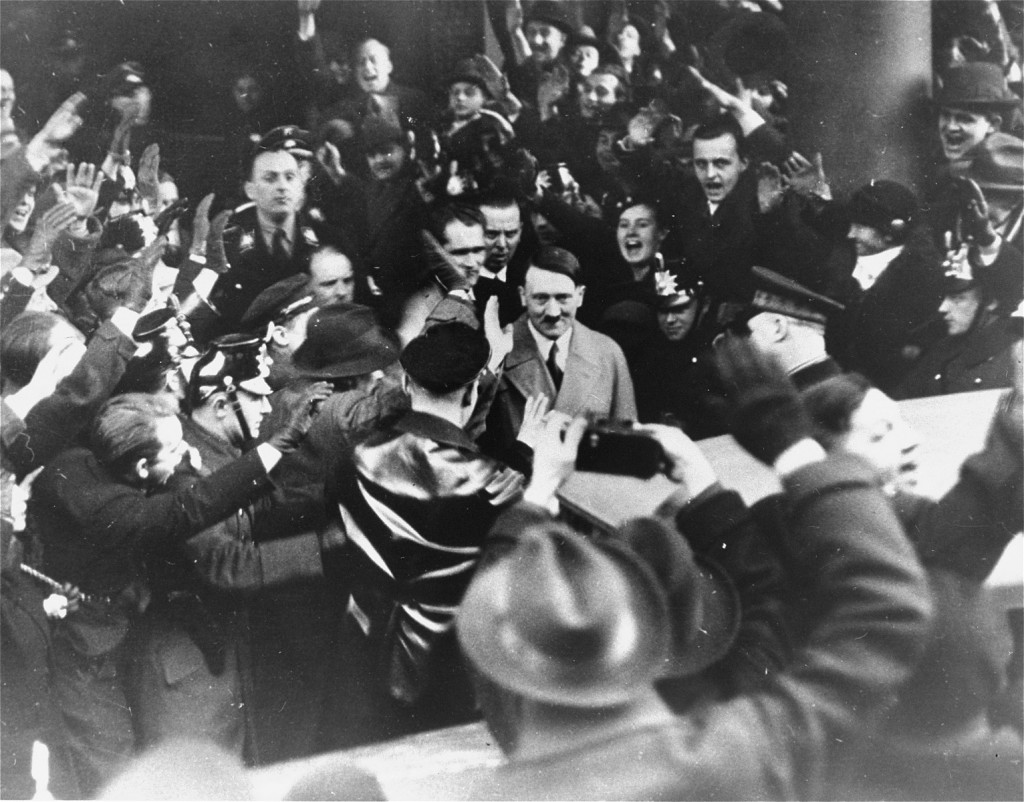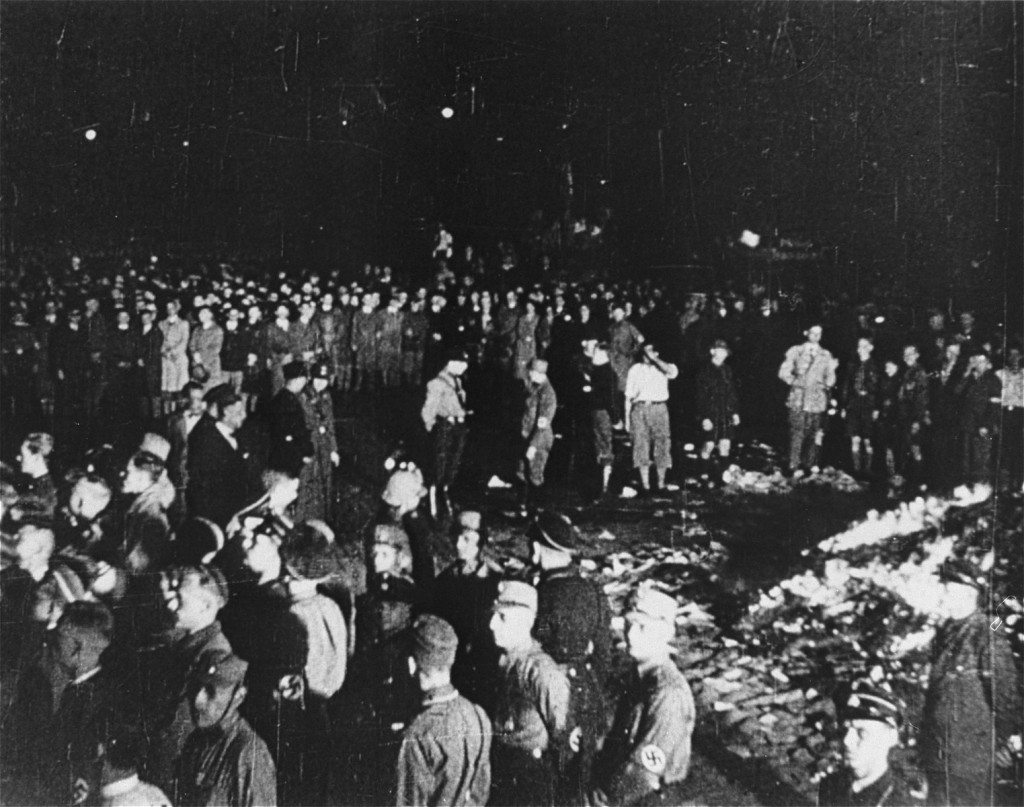
1933: Key Dates

January 30
The National Socialist German Workers' Party (Nationalsozialistische Deutsche Arbeiterpartei; NSDAP), more commonly known as the Nazi Party, assumes control of the German state when German President Paul von Hindenburg appoints Nazi Party leader (Führer) Adolf Hitler as Chancellor at the head of a coalition government of “National Renewal.” The Nazis and the German Nationalist People's Party (Deutschnationale Volkspartei; DNVP) are members of the coalition.
February 27
The German parliament (Reichstag) building burns down due to arson. The government falsely portrays the fire as part of a Communist effort to overthrow the state.
February 28
In the Decree of the Reich President for the Protection of People and State, President von Hindenburg grants emergency powers to the Nazi/DNVP coalition government under Adolf Hitler. Popularly known as the Reichstag Fire Decree, and justified by a profoundly exaggerated threat of a German Communist uprising, the decree suspends civil rights in Germany and allows for imprisonment without trial. It also gives the central government the authority to overrule state and local laws and overthrow state and local governments.
March 5
The last elections take place in Nazi Germany. Despite possessing the coercive powers of the state, the Nazi Party receives less than half (43.9%) of the popular vote. As a result, the Nazi Party remains in coalition with the DNVP to achieve a majority in the German parliament.
March 9-11
Under authority of the Reichstag Fire Decree, the Nazi/DNVP coalition government overthrows the German state governments (Länderregierungen) and installs provisional Reich commissars who are directly subordinate to the central government.
March 22
Outside the town of Dachau, Germany, the SS (Schutzstaffel, Protection Squads) establishes the first SS-managed concentration camp to incarcerate political opponents of the regime. Dachau is the only concentration camp to remain in operation from 1933 until 1945.
March 23
The German parliament passes the Law for Rectification of the Distress of Nation and Reich (Gesetz zur Behebung der Not von Volk und Reich), commonly known as the Enabling Act (Ermächtigungsgesetz). This law allows Hitler, as Chancellor, to initiate and sign legislation into law without obtaining parliamentary consent. The act effectively establishes a dictatorship in Germany.
April 1
Members of the Nazi Party and its affiliated organizations (such as the SS, SA, and the Hitler Youth) organize and implement a nationwide boycott of Jewish-owned businesses in Germany.
April 7
The German government issues the Law for the Restoration of the Professional Civil Service (Gesetz zur Wiederherstellung des Berufsbeamtentums), which excludes Jews and political opponents from all civil service positions. The law initially exempts those who had worked in the civil service since August 1, 1914, those who were veterans of World War I, or those with a father or son killed in action in World War I.
The German government issues a law concerning membership in the bar, which mandates the disbarment of non-"Aryan" lawyers by September 30, 1933. Exempted from this provision are Jewish lawyers practicing law since August 1, 1914, or Jewish lawyers who are veterans of World War I.
April 11
The German government issues a decree requiring civil servants who acquired their positions after August 1, 1914, to prove their "Aryan" ancestry or their status as World War I veterans. This law effectively classifies who was considered Jewish and non-"Aryan": every person with one or more non-"Aryan" parent or grandparent is considered non-"Aryan."
April 26
Hermann Göring, Minister President and Minister of the Interior of Germany's largest state, Prussia, creates a new agency, the Gestapo (Geheime Staatspolizei, or Secret State Police), from the old Prussian state political police department.
May 7
The German government decrees that all Jewish workers and employees of the German armed forces (Reichswehr) be dismissed from service.

May 10
German student organizations supported by Nazi Party members organize public rallies across Germany. They burn books written by Jews, political opponents, and liberal intellectuals, and announce that they are "purifying" German libraries of "un-German" books.
July 14
The German parliament issues the Law against the Founding of New Political Parties, which establishes the Nazi Party as the sole legal political party in Germany. Nazi Germany formally becomes a one-party state.
The German government enacts the Law for the Repeal of Naturalization and Recognition of German Citizenship (Gesetz über den Widerruf von Einbürgerungen und die Aberkennung der deutschen Staatsangehörigkeit), which deprives recently naturalized German Jews of German citizenship.
The German government passes the Law for the Prevention of Offspring with Hereditary Diseases (Gesetz zur Verhütung erbkranken Nachwuchses), mandating the forced sterilization of certain individuals with physical and mental disabilities. This law provides the basis for the involuntary sterilization of people with physical and mental disabilities or mental illness, Roma (Gypsies), “asocial elements,” and Black people.
September 17
German Jewish organizations form the Central Organization of German Jews (Reichsvertretung der deutschen Juden) in an effort to better represent the interests of German Jews through a unified response.
September 22
In Germany, the newly founded Chambers of Literature, Press, Broadcasting, Theater, Film, Music, and Fine Arts deny membership to Jews, effectively excluding Jews from employment in the cultural sector.
September 29
The German government issues the Hereditary Farm Law (Reichserbhofgesetz) stipulating that hereditary farms (“Erbhöfe”) could only be inherited by German farmers able to document that they had no Jewish or “colored” ancestors back to January 1, 1800.
October 4
The Editor's Law (Schriftleitergesetz) forbids non-“Aryans” to work in journalism.
November 24
The German government passes the Law against Dangerous Habitual Criminals. The law allows the courts to order indefinite imprisonment of “habitual criminals” if they deem the person dangerous to society. It also provides for the castration of sex offenders.
Critical Thinking Questions
Learn about warning signs for mass atrocity and genocide. What events during 1933 might be examples?
How can “national emergencies” lead to human rights violations and even atrocities?

